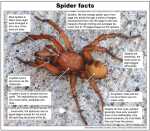Invasion of the spiders!

The annual invasion has already begun...
If given the opportunity, they'll get around locked doors and sealed windows to get inside. And once they've gotten in, they won't want to leave -- at least not willingly.
It's a yearly occurrence that Mir Seyedbagheri knows all too well. As the agricultural extension professor with the University of Idaho extension office in Mountain Home, he's become well acquainted with these eight-legged invaders, which frighten a fair share of people and keep others nervous.
But spiders don't need to be seen as scary invaders. Contrary to their creepy appearance, they are something that people should save versus their normal reaction, which generally involves a rolled up newspaper or the bottom of a shoe, according to Seyedbagheri.
But he also understands that spiders can overstay their welcome if they manage to take someone's home and make it their own.
In their natural habitat, spiders are extremely beneficial to maintaining a healthy balance in the environment, Seyedbagheri said. While their webs are a nuisance for anyone that's stepped through them, these highly resourceful predators help keep nature in balance by cutting down the number of nuisance and harmful insects that congregate around people's gardens, flower beds and shrubs.
Typically, spiders will avoid going after environmentally friendly insects, which makes them even more beneficial for people to keep around their property. If people see spiders in their garden, that's actually a good sign, Seyedbagheri said.
"That's what we really want to promote. Don't worry about them," he added.
But as the seasons change, spiders typically go inside for one simple reason: It gets cold outside, he said. In rare instances, male spiders will also sneak inside someone's home because they're looking for a mate.
If given the opportunity, these unwanted visitors will take advantage of nooks, crannies and gaps around windows, siding and foundations to take refuge indoors. Sometimes, people will also extend the "welcome mat" without realizing it, Seyedbagheri said.
Firewood is just one way they get can hitch a ride in a person's house or cabin. There are plenty of crevices in these logs where spiders can lay their eggs.
"When it gets warmer, of course those eggs are going to hatch... and they migrate someplace else," Seyedbagheri said.
Another common mistake people make happens when they prune their trees and shrubs. Often, they will pile this debris next to their home, which will typically include a fair share of spiders that will take this opportunity to move inside.
Since spiders have extremely poor eyesight and normally react to motion, it really takes a lot to convince them to bite someone, Seyedbagheri said.
"They want to be in their own environments. They want to be in their webs," he added. "They are not going to do anything" to harm someone unless they disrupt its nest or web.
Many incidents happen when someone invades a spider's turf by sticking their hand in a web or nest while they are gardening or working outside.
In other instances, they might get their feet or legs bit if they walk through a spider's domain. Seyedbagheri has seen instances, for example, where people got their toes bit after they put on their shoes, which were left out where a spider took up residence.
More than 95 percent of spiders that people in Idaho encounter are generally beneficial ones, including crab spiders and orb weavers that people want to keep, especially in their gardens and flower beds.
It's the other 5 percent that cause problems when humans or pets get in their way. The most infamous are black widow spiders, whose venom can sicken most people.
Then there are hobo and wolf spiders, which in addition to growing fairly large have a fairly painful bite.
The easiest way to keep spiders out of the home? Keep it clean.
"Sometimes, people in their homes create an environment where spiders come," he added.
They prefer places that remain undisturbed, especially areas where dust collects. Their favorite haunts include window sills, the tops of window curtains and behind furniture.
They will also spin their webs near people's houseplants and beneath refrigerators and other appliances. It's these places that people forget to clean, giving these uninvited guests a chance to take up permanent residence.
"The main thing is that if people keep these places clean -- the areas that collect the dust -- then they shouldn't have a problem," Seyedbagheri said.
The most effective weapon to dealing with spiders? Try a vacuum cleaner.
Simply sweeping up these unwanted webs is all it took to tell these unwanted visitor to take a hike.
"If we get rid of those environments, they're not going to lay their eggs there... or want to stay there," he said.
If the problem persists, Seyedbagheri recommends that people step up their efforts by using biological insecticide soaps versus chemical sprays. The fatty acids in the soap act as the perfect repellent since spiders and other insects hate these type of acids. They are also safe to use around pets and small children.
"I strongly believe.. that we don't need to spray harmful chemicals," Seyedbagheri said.
There's another problem that people forget when they resort to using chemical sprays and other pesticides, he added. Insects will eventually grow immune to these chemicals, rendering them useless.
If people do resort to chemical sprays as a last resort, it doesn't take much to kill an unwanted spider.
"One shot will take care of them," he said.
But Seyedbagheri discourages people from destroying spiders when possible. Instead, he recommends capturing them and reintroducing them back into their natural outdoor habitat.
When releasing them, people should look for places where other spiders have already built webs. This gives the relocated spider the best chance to survive on their own.
"They love that. They already have webs, and they'll try to survive there," Seyedbagheri said.
